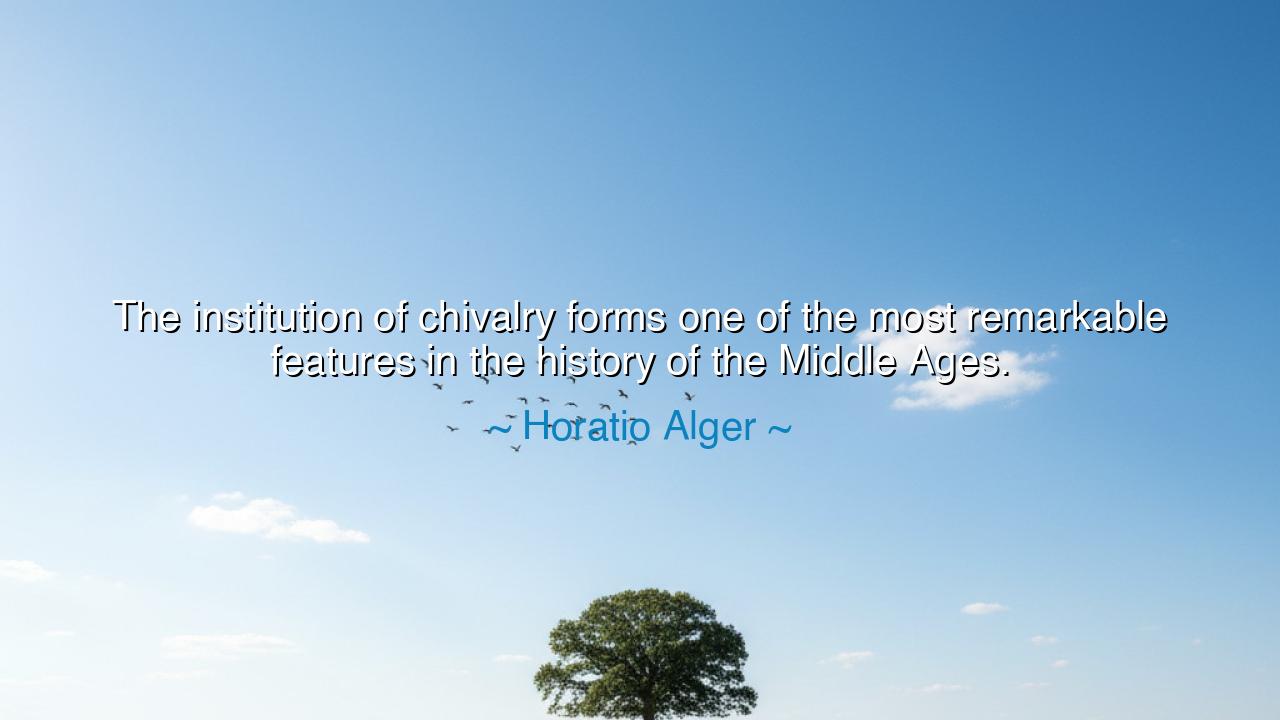
The institution of chivalry forms one of the most remarkable
The institution of chivalry forms one of the most remarkable features in the history of the Middle Ages.






“The institution of chivalry forms one of the most remarkable features in the history of the Middle Ages.” – Horatio Alger
In this dignified reflection, Horatio Alger, known for his tales of virtue, courage, and self-made character, casts his gaze upon a far older code of honor — the ancient spirit of chivalry. He calls it “one of the most remarkable features in the history of the Middle Ages,” for in it he saw not merely the customs of knights and courts, but the moral soul of an era. To Alger, who lived in the nineteenth century — a time of industrial ambition and moral upheaval — the chivalric code stood as a beacon from the past, reminding mankind that strength, when guided by virtue, becomes nobility. Chivalry was not just a set of rules for warriors; it was a covenant of the soul, a discipline that bound the sword to the service of honor, compassion, and faith.
The origin of this quote lies in Alger’s lifelong reverence for moral idealism. Though best known for his stories of poor boys rising to success through honesty and perseverance, Alger was also a student of moral history. He saw in the knights of the Middle Ages a reflection of his own heroes — men who rose above selfish ambition through courage and righteousness. The institution of chivalry, to him, was the noble attempt of a brutal age to tame strength with virtue. In a world of violence, where might often ruled over right, chivalry stood as a living experiment — an effort to bring morality to power, to teach men that valor meant nothing without mercy, and that glory was hollow without justice.
In the history of the Middle Ages, chivalry emerged like a flame amidst the darkness. The knights who swore their oaths were bound to defend the weak, protect the innocent, and serve God and king with loyalty. But this oath was more than ceremony; it was a spiritual calling. The knight’s armor was not only forged of steel — it was tempered in the fires of discipline and humility. Beneath the grandeur of tournaments and banners, the heart of chivalry lay in a simple truth: that true power is moral power, and that courage without compassion is but another form of cruelty. Thus, in the harsh feudal world, chivalry became the conscience of strength — the poetry of war and the morality of courage.
Consider the tale of Sir William Marshal, a man historians have called “the greatest knight.” Born to no great fortune, he rose through valor and loyalty to serve five English kings. He fought with unmatched skill, yet his greatness was not his swordsmanship but his character. When given power, he ruled with justice; when offered betrayal, he chose honor. Even his enemies admired his fairness, and when he died, he was buried as both knight and monk — his life a perfect balance between the world of arms and the world of faith. Marshal’s story illuminates what Alger meant by chivalry’s remarkableness: it was not just a historical institution but a moral ideal, one that proved men could rise above greed and savagery through duty, honor, and integrity.
Yet chivalry was not without flaw. Many who wore its name betrayed its spirit, using its rituals as excuses for vanity or conquest. But this, too, is part of its meaning. Alger calls it “remarkable” not because it was perfect, but because it attempted the impossible — to make morality the companion of power. In an age when kings ruled by force and life was cheap, chivalry dared to ask that warriors fight not for gold, but for goodness. Even when it faltered, its very existence planted the seed of conscience in Western civilization, leading to the later ideals of justice, equality, and human dignity. From the oaths of knights would one day grow the charters of rights and the moral codes of nations.
The spirit of chivalry still speaks to our age. Though the shining armor has rusted and the castles have fallen, the code endures — not as a relic, but as a challenge. To live chivalrously today is to be brave in defense of truth, to show courtesy when others are cruel, to protect the powerless, and to restrain one’s strength with humility. In a world where ambition often tramples virtue, the old knightly ideal whispers its eternal counsel: “Be strong, but be good.” The modern warrior may wield a pen or a word instead of a sword, but the battle for integrity remains the same.
So, my listener, learn from Horatio Alger’s insight. Study not only the shining achievements of the Middle Ages, but the soul of chivalry that burned within it. Seek not glory for yourself, but honor in service to others. Let your courage be guided by compassion, your strength by principle, and your ambition by humility. For though centuries have passed since the knights rode beneath their banners, the true battlefield remains — the human heart. And in that eternal field, the code of chivalry still calls to all who would live with honor, kindness, and moral strength.
Thus, remember always the wisdom of the ages: chivalry was never about swords or crowns — it was about the victory of virtue over power. That, indeed, is why it remains one of the most remarkable features in all of history — not because it belonged to the past, but because it still belongs to all who strive to live nobly today.






AAdministratorAdministrator
Welcome, honored guests. Please leave a comment, we will respond soon